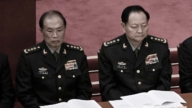【新唐人2012年2月3日讯】继29名中国工人在苏丹遭绑架,日前再传出20多名受雇于一家建筑公司的中国工人,在埃及西奈半岛遭当地人绑架。社会问题专家表示,由于中共对外扩张、利益垄断,直接触犯了当地人的利益,国外民众不会像中国人民那样,采用上访的方式解决问题,最终中国工人被牺牲。
1月28号,“中水电集团公司”在苏丹南科尔多凡州的公路项目,遭到反政府武装组织“苏丹人民解放运动 (北方局) ”的袭击,29名中国工人被劫持。
3天后﹙1月31号﹚,再有25名中国人在埃及西奈地区,遭贝都因族“统一和圣战”组织绑架,除一名翻译外,其余24人是“天津水泥设计院”援建埃及水泥厂项目的工人。不过,这25人已被释放。
“中国社科院西亚非洲研究所”非洲研究室主任贺文萍表示,中共外交部,各驻外使馆,之前就应该与中国在外工人所在国政府的关系沟通好,一旦发生突发事件,使馆尽快展开谈判或营救,确保人质安全。然而,在苏丹被绑的29人,通讯已被断绝,目前仍未获救。
研究中国社会问题人士宋书元指出,中国在外的劳工实际上工资都很低,在海外的工作艰难。他们付出的代价和他们的工资完全不成比例。他们只是被中共利用,承受的是第二次伤害。
宋书元:“这些华工出去,包括他的技术人员,实际上完完全全在中共政府的监控之下。工资、思想、政治活动,一切都不能正常表达。所以出现问题,它(中共)把它(绑架事件)提到一个政治高度。就是多么的关心华人,多么尊重人的价值等等,实际上空架子,它里面没有真正的内容。”
《金融时报》报导认为,这些绑架事件提醒人们,中共向新兴市场的迅速渗透,让越来越多的中国公民生活和工作在危险环境之中。
“欧亚评论”网站的文章则表示,很多关于中国在非洲活动的资料都认为,中共在非洲搞“新殖民主义”。
另外,原“建科电子有限公司”董事长、研究中国社会问题人士张健则认为,共产党不仅通过经济的方式,输送中国劳力侵害了别国的经济利益,同时也向海外输送党文化。
张健:“我们反过来去看,你在当地一个原生态的情况下,忽然中国大量的这种利益集团、寡头集团去垄断当地的资源。中国又通过大量的劳动力去侵害,去导致当地这种宗教、文化等等破坏、不和谐。一定会导致利益之间,民族这种差别,这种差别一旦扩大化,达到临界点的时候。当地的人们就不太会喜欢这种东西的存在,那么他们势必就会产生这种矛盾。”
对于这次中国工人被绑架事件,国际媒体除了探讨北非国家的国内争端,也有另种角度诠释,认为这是中共“扩张”的代价。
张健:“我们现在看到的这些扩张,它们都是针对发展中国家的资源垄断下手,它们把这种垄断又带到另一个国家。它们同样给当地的政府和这个国家人民带来巨大的灾难。”
张健认为,中共是想把国家变成个人的,通过国际间这种取财方式,来转变资源的分配。由于中共直接触犯了当地人的利益,国外民众不会像中国人民采用上访的方式解决问题,他们就用绑架工人的方式,来解决他们的问题。
新唐人记者常春、唐睿、肖颜 采访报导。
——————
Chinese Labor Abductions—The Cost of CCP’s Expansion Overseas
Since 29 Chinese workers were kidnapped in Sudan,
another 20-plus Chinese were abducted recently in Egypt.
Experts on social issues comment that
the Chinese regime’s overseas
expansion and monopoly goes directly against local people’s
interests.
In order to solve this issue, residents would rather
use kidnapping than petitioning to the Chinese regime.
But in the end, the Chinese overseas workers become the
sacrificed victims.
29 road construction workers of China’s Sino-hydro Corp were
kidnapped on January 28th, in South Kordofan, Sudan.
The abductor was reportedly anti-government rebel troops-
Sudan People’s Liberation Movement-North.
On January 31st, another 25 Chinese people were abducted
in Egypt’s Sinai by Egyptian Bedouins.
Besides one interpreter, all victims were workers dispatched
by Tianjin Cement Design Institute. All 25 have been freed.
He Wenping, Director of Institute of West-Asian and African
Studies, Chinese Academy of Social Sciences, says that the
Chinese regime’s Foreign Ministry and its local embassies
should have communicated earlier with local authorities.
In the event of emergencies, local Chinese Communist Party
embassies should take action to negotiate or rescue and protect its hostages.
According to He, communications are being cut off with the
29 kidnapped workers in Sudan, who still remain in hostage.
Expert on Chinese society studies, Song Shu-yuan, points out
that Chinese workers overseas are paid very low wages for
their hard work.
The sacrifice they endure is out of proportion to their wages.
According to Song, the Chinese regime is using
its workers, so actually being abducted is yet another harm.
Song Shu-yuan: “These overseas Chinese workers including
technicians, are all completely monitored by the CCP regime.
They have no channel in which to express their wages’ appeal,
thoughts and political activities, etc…
When any problem breaks out, the Chinese regime always
deals with it from a political point of view.
It touts how the CCP is concerned for the Chinese overseas,
how it respects human values, and so on.
But all these remarks have no real meaning."
The Financial Times reported that these kidnappings are a
warning to the international community.
The Chinese regime’s rapid penetration into the world’s
emerging markets has exposed more Chinese citizens to danger.
An article from a western internet forum that comments on
public data, says that
much data related to the Chinese regime’s activities in Africa
reveal that the Chinese Communist Party is launching its “neocolonialism" of Africa.
Zhang Jian, former president of Jianke Electronics, is a
scholar in Chinese society studies. Zhang thinks that the
Chinese regime’s labor export not only harms local economies,
but also brings there the Chinese Communist Party culture.
Zhang Jian: “Let’s take a look back.
Suppose you’re living in an original ecosystem.
Suddenly the place is flooded with Chinese interest groups and
oligarchic groups who want to monopolize local resources.
Moreover, masses of Chinese labor forces are dispatched there.
All these acts directly trigger the ruin and disharmony of the local religion and culture.
Once it reaches a critical point, local people will be disgusted.
Thus, conflicts will take place inevitably."
Besides exploring domestic disputes in North African nations,
the international media has new interpretations on the kidnap
incidents. That is the cost being paid by the CCP’s expansion.
Zhang Jian: “All the expansion we’ve seen so far aims for
monopolizing the resources of developing countries.
They bring such monopoly into another country, causing
huge disaster to both local authorities and residents."
Zhang Jian says that the Chinese Communist Party wants
to turn the country into its own private property.
The regime aims to change the allocation of resources
by means of international financial operations.
And because the Chinese regime directly infringes on
local people’s interests,
the locals try to solve the problems themselves by kidnapping
Chinese workers instead of petitioning to the regime.
NTD reporters Chang Chun, Tang Rui and Xiao Yan






























